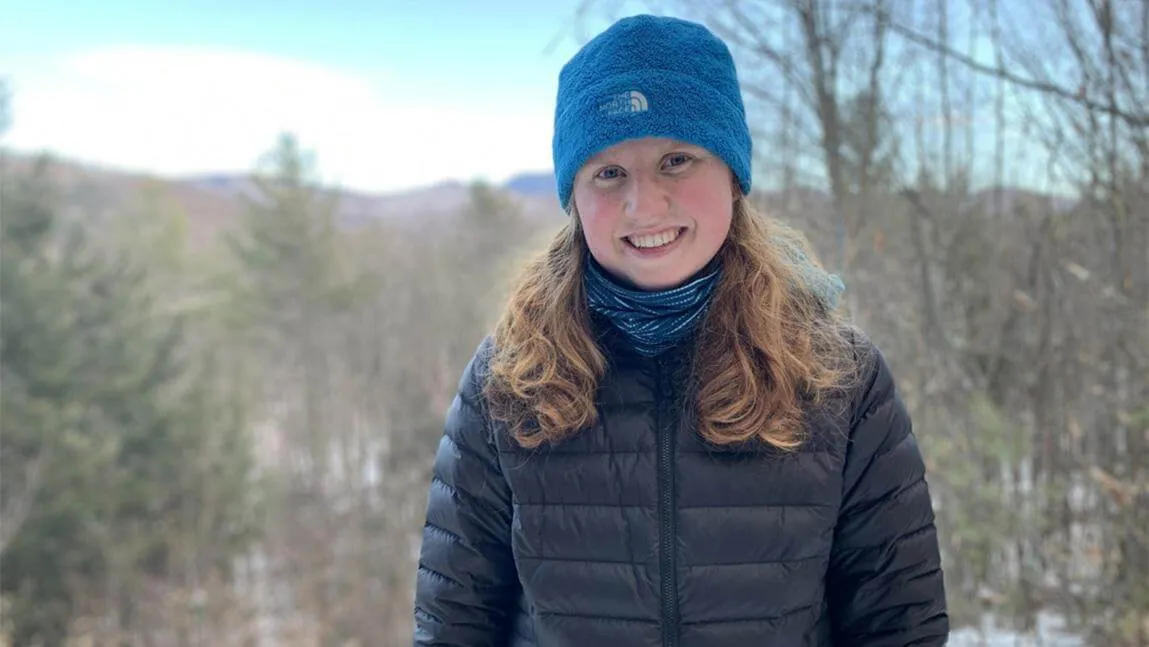“I have always been interested in climate change work and feel it is an important ecological problem to which I would like to contribute through research,” said University of Vermont senior Olivia Vought ‘21, an Environmental Sciences major in the Rubenstein School of Environment and Natural Resources.
During her four years at UVM, Olivia blazed a path to a career in ecological research.
“In high school I knew I wanted to study the environment, and UVM’s reputation as a leading environmental school drew me here,” said Olivia, who grew up in Syracuse, New York.
“The community of the Rubenstein School helped to foster some amazing opportunities and helped me to develop personal relationships with my professors,” said Olivia, a teaching assistant in three environmental courses and a research lab assistant in Rubenstein School Associate Professor Carol Adair’s biogeochemistry laboratory and former Rubenstein School Professor Aimée Classen’s global change ecology laboratory.
Olivia quickly learned how a lab operates and how to run the instruments used in ecosystem science research. As a sophomore, she applied to the UVM Honors College to pursue a senior research thesis and began conducting a study related to climate change with faculty advisor Carol Adair.
“Though it’s not necessary to be in the Honors College to do a thesis, it was valuable for me to go through the process of defending a thesis, an undergraduate experience I would have likely only been able to do as an Honors College student,” said Olivia.
Captivated with research, she delved into a summer research project on moss distribution in streams at Hubbard Brook Experimental Forest in New Hampshire as a National Science Foundation REU (Research Experiences for Undergraduates) student with Cary Institute for Ecosystem Studies.
“Through that experience, I fostered my love of research and found satisfaction in taking an aquatic moss study from start to finish,” said Olivia, who presented her research findings at the Ecological Society of America annual meeting.
Senior Thesis to PhD
For her Honors College thesis research, Olivia concentrated on soil carbon and its relationship to climate change. The carbon cycle plays an important role in regulating global temperature and climate by controlling the amount of carbon dioxide in the atmosphere. Too much carbon dioxide going into the atmosphere can make a planet become unnaturally warm.
“What I didn’t know until later in college is that more carbon is held in the soil than in the atmosphere and plants combined,” said Olivia. “Therefore, even small fluctuations in this carbon stock will result in large impacts to the global carbon cycle. The global carbon cycle is important to understand when trying to determine how to fight the climate crisis.”
Olivia investigated climate, forest, and soil characteristics to see which variables are most significant in determining how much soil organic carbon is present in different ecosystems. She conducted a computer meta-analysis of data gathered from 61 sites across the globe.
“Most importantly, I was trying to understand whether aboveground carbon, such as leaves that fall from trees, are important in determining how much carbon is stored belowground,” said Olivia.
She found that aboveground carbon was not important in determining the belowground carbon stocks in any biome—temperate, boreal, or tropical forests.
“This is interesting because it establishes that leaf litter and carbon on the soil surface are not what is driving carbon formation underground,” said Olivia, “something that traditional ecological theory believed to be true. Now, there is a growing body of research, including my thesis, that indicates leaf litter isn’t where soil carbon primarily comes from.”
Olivia presented her research at the UVM Student Research Conference this spring. Her project, “The Missing Linkages Between Mineral Soil Organic Carbon and Litter Decomposition,” was chosen as a winner in the judged session.
She is yet another step closer to her research career. In the fall, she will once again work with Professor Aimée Classen, now at the University of Michigan, in a PhD program in ecology and evolutionary biology. Olivia will investigate the influence of climate change on seasonal transitions, such as how a changing climate is altering the nutrient cycling that happens in the springtime.
After graduate school, Olivia hopes to stay in academia and become a professor, run her own research lab, and continue helping to understand how to mitigate climate change.
